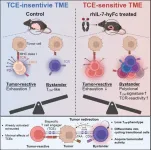(Press-News.org) By Alistair Jones
SMU Office of Research - If you dread public speaking you are not alone. It is a leading social phobia, one that can cause a state of anxiety that reduces otherwise articulate people to nervous incoherence.
A strong fear of public speaking is known as glossophobia. Academic studies estimate it affects 20 per cent of the population, but depending on the sample and methodology, the figure could be as high as 40 per cent.
As American writer and humourist Mark Twain said, "There are two types of speakers: Those who get nervous and those who are liars.”
But help may be on the way. Kyong Jin Shim, an Associate Professor of Information Systems at Singapore Management University (SMU), is leading a research project that explores the integration of virtual reality (VR) technology and AI to improve public speaking skills in students.
And while the research specifically focuses on evaluating the effectiveness of utilising this technology for the development of public speaking skills for university students, the methodology could have wider applications. The project has been awarded an MOE Tertiary Education Research Fund (TRF) grant and the proposed solution is called PresentationPro.
"[Through headsets], presenters will see a three-dimensional virtual environment that mimics a real-world presentation setting, complete with a crowd of AI-driven avatars representing an audience," Professor Shim says.
"These avatars will display behaviours typical of a live audience, such as nodding, making eye contact, showing various expressions and providing real-time feedback to the presenter," Professor Shim says.
In a high-tech update on practice makes perfect, PresentationPro aims to provide a way for presenters to hone their public speaking skills without the logistical challenges of assembling a live audience for every student.
The team is collaborating with SMU’s Centre for English Communication (CEC) to translate their “presentation” know-how and best practices into a digital platform, and eventually to scale CEC’s communication coaching.
Avatar triggers
The VR content, including the audience avatars, is generated through a combination of advanced computer graphics and AI algorithms. To make the avatars responsive in real time is no small task.
"This is achieved through sophisticated AI programming that includes natural language processing (NLP) and behaviour modelling. The system uses machine learning to analyse the presenter’s speech and body language, allowing avatars to respond realistically in real time to both verbal and non-verbal cues," Professor Shim says.
By working with SMU’s Centre for Teaching Excellence (CTE), Professor Shim’s faculty team tapped into CTE’s expertise in classroom management and wealth of knowledge in different kinds of behaviour that can manifest in classroom “presentation” scenarios. The behaviours of students and faculty/instructors play a crucial role in engineering PresentationPro’s “audience avatar” behaviours using AI.
But can the avatars interrupt the presenter?
"Yes, avatars can interrupt and ask questions, simulating a dynamic interaction typical of real audiences. This capability is enabled by integrating NLP and speech recognition technologies, allowing avatars to process spoken language and respond appropriately," Professor Shim says.
The physical cues of presenters will also be monitored.
"In addition to heart rate tracking with Fitbits, the system uses VR headsets such as Meta Quest equipped with head and gaze tracking technology to monitor where the presenter is looking, such as whether they are avoiding eye contact by staring at their feet. Gesture tracking is also employed to catch other physical behaviours like fidgeting," Professor Shim says.
Verbal triggers for the avatars are set up using a combination of speech recognition and sentiment analysis technologies.
"These triggers are calibrated to recognise various speech patterns and anomalies such as tics, stutters, or deviations from the script, which then cue the avatars to react in specific ways that mimic a real audience's response," Professor Shim says.
Behavioural changes
The researchers have generated digital twins, which are highly detailed digital replicas of human behaviours and interactions – much like individuals – ensuring a diverse and realistic audience simulation reflective of a typical SMU classroom.
"Using different avatars helps to avoid repetition and predictability in audience reactions, enhancing the realism of the virtual environment and mimicking a typical seminar or classroom setting," Professor Shim says.
"VR and AI can simulate realistic social interactions, which can help individuals practise and improve their public speaking skills in a low-risk environment. Repeated exposure and positive reinforcement through VR can reduce anxiety, build confidence and lead to behavioural changes.
"Improvements will be measured through both subjective evaluations (participant and instructor feedback) and objective metrics (performance data collected during VR sessions and traditional in-person assessments). Comparisons will be drawn between control and experimental groups to assess the efficacy of VR training," Professor Shim says.
Transformative tool
Interestingly, for a project that is about behavioural change, no psychologists were among the project's expert investigators when it began.
"The research team primarily consists of specialists in education technology, AI, and public speaking, focusing on the technological and instructional design aspects of the project," Professor Shim says.
"Although psychologists play a crucial role in understanding and addressing anxiety, our project's current scope concentrates on developing and integrating AI-driven solutions for public speaking training. Nevertheless, we recognise the value of interdisciplinary collaboration and are very open to partnering with experts in the social sciences to enhance our understanding of anxiety management.
"Such collaborations could lead to further refinements in our VR system, ultimately enriching the learner's experience by more effectively addressing public speaking anxiety."
Professor Shim has since added SMU Assistant Professor of Psychology Andree Hartanto to the team to explore:
Psychological mechanisms through which VR may reduce glossophobia;
Long-term impacts of VR training on public speaking anxiety; and
Differential effects of VR training across diverse demographic groups
Professor Shim's journey into VR applications began in 2021 with a prototype designed to train new lecturers at SMU.
"My personal experiences as a faculty member, grappling with the challenges of adapting to a new cultural and academic environment, deeply influenced this initiative. During my early years at SMU, I found lecturing to a seminar-style classroom of 45 students from diverse backgrounds to be particularly daunting," she says.
"As I transitioned into a mentorship role for newer faculty members, I realised how beneficial immersive technologies like VR could be in accelerating the on-boarding process for new lecturers. This technology allows them to practice lecturing in their own time and space, repeat sessions as needed, and eliminates the logistical challenges of scheduling real seminar rooms and audiences.
"Inspired by the potential of this initial application, we set out to develop a similar VR system to enhance public speaking skills for students. This project not only leverages my teaching-related research in collaboration with CTE, but also builds upon our foundational work in VR, aiming to provide a transformative educational tool for a wider audience," Professor Shim says.
END
Relieving a fear of public speaking
2024-05-31
ELSE PRESS RELEASES FROM THIS DATE:
Innovating learning with ChatGPT-based Prompt Tutor
2024-05-31
By Jovina Ang
SMU Office of Research – “Giving students immediate and frequent feedback makes online learning more effective,” Associate Professor Ouh Eng Lieh told the Office of Research.
However, based on how most online lessons are designed, questions could not be answered nor doubts clarified until students meet their instructor in the following face-to-face class.
The time delay of a few days to a few weeks can impede student learning as it might make it difficult for students to catch up and understand the subsequent topics in the course.
Learning also ...
Moving beyond cubicles: How an active workplace design can drive workers’ behaviors
2024-05-31
Ishikawa, Japan -- Physical inactivity and sitting for prolonged hours are highly prevalent among office-based workers, known to be resulting in various health risks and economic constraints. However, to reduce sedentary time and increase physical activity, health promotion interventions alone are insufficient. The design of workplaces should also be considered to promote interactive behavior among workers.
Many models, such as the socio-ecological model, show how multiple factors interact to influence workers' active and sedentary behaviors. These models specifically magnify the impact of workplace environments in shaping these behaviors. Several studies ...
Breakthrough in using bispecific antibodies for solid tumors
2024-05-31
Professor Seung-Woo Lee and PhD candidate Kun-Joo Lee from the Department of Life Sciences at Pohang University of Science and Technology (POSTECH), in collaboration with NeoImmuneTech Director Donghoon Choi and Professors Dae Hee Kim and Sun Shim Choi from Kangwon National University, have revealed a groundbreaking method to significantly enhance the efficacy of bispecific antibody therapies in treating solid tumors. Their findings were published on May 13 in “Cell Reports Medicine”, an international journal of healthcare research.
Bispecific antibodies, which can simultaneously bind to two different ...
Fjords are effective carbon traps regardless of oxygen levels
2024-05-31
The fjords on Sweden’s west coast act as effective carbon traps regardless of whether the bottom water is oxygen-rich or not. This is the conclusion of a new study with researchers from the University of Gothenburg.
Large quantities of plant parts sink to the bottom of fjords on the Swedish west coast where they form sediment. This buries organic carbon, which would otherwise contribute to ocean acidification and the greenhouse effect. When the plant parts are exposed to oxygen and other substances, the organic carbon begins to decompose into inorganic carbon, which can be dissolved into carbonic acid in the water. Research ...
Korea University College of Medicine’s team predict hearing conditions in vestibular schwannoma patients using radiomics
2024-05-31
Korea University College of Medicine’s Team Predict Hearing Conditions in Vestibular Schwannoma Patients Using Radiomics
A recent study demonstrates that radiomics imaging analysis can effectively forecast the hearing status of patients with vestibular schwannoma patients. Since treatment methods, such as surgery or active surveillance, vary for these patients based on tumor size and hearing condition, predicting hearing status is crucial in planning and determining the appropriate treatment.
The research team led by Professor June Choi from the Department ...
European Academy of Sciences honors Rice’s Pol Spanos with prestigious award
2024-05-31
HOUSTON – (May 31, 2024) – For his “exceptional contributions to the field of dynamics,” Pol Spanos, the Lewis B. Ryon Professor of Mechanical and Civil Engineering at Rice University, has been awarded the 2024 Blaise Pascal Medal in Engineering by the European Academy of Sciences.
Spanos, who joined the Rice faculty in 1984, was recognized for his “theoretical insights, ranging from equivalent linearization to statistical quadratization, which have significantly advanced our understanding of structural behavior. These insights have not only led to more accurate predictions but have also empowered engineers ...
Rice’s Jamie Padgett wins Charles Martin Duke Lifeline Earthquake Engineering Award
2024-05-31
HOUSTON – (May 31, 2024) – Jamie Padgett, the Stanley C. Moore Professor in Engineering and chair of civil and environmental engineering at Rice University, has received the 2024 Charles Martin Duke Lifeline Earthquake Engineering Award from the American Society of Civil Engineers (ASCE).
Padgett was recognized for her “contributions to fragility, risk and resilience modeling of multimodal transportation systems and their infrastructure components when subjected to earthquakes and other hazards.”
Her ...
Sleep moderates the link between bullying and suicide in teens
2024-05-31
DARIEN, IL – A new study to be presented at the SLEEP 2024 annual meeting found that sleep duration significantly moderates the association between bullying and suicide attempts among adolescents in the U.S.
The study revealed that 15% of adolescents reported they were bullied at school, and 16% were bullied electronically; 10.2% reported they had attempted suicide during the past year; and 77.3% did not adhere to sleep duration recommendations. Adolescents who reported 4 hours of sleep or less per night were two times as likely to attempt suicide, and sleep duration significantly moderated the association between bullying ...
AI-controlled stations can charge electric cars at a personal price
2024-05-31
As more and more people drive electric cars, congestion and queues can occur when many people need to charge at the same time. A new study from Chalmers University of Technology in Sweden shows how AI-controlled charging stations, through smart algorithms, can offer electric vehicle users personalised prices, and thus minimise both price and waiting time for customers. But the researchers point to the importance of taking the ethical issues seriously, as there is a risk that the artificial intelligence exploits information from motorists.
Today's commercial ...
The world’s most powerful anti-fungal chemistries cause fungal pathogens to self-destruct
2024-05-31
Scientists have discovered that the most widely-used class of antifungals in the world cause pathogens to self-destruct. The University of Exeter-led research could help improve ways to protect food security and human lives.
Fungal diseases account for the loss of up to a quarter of the world’s crops. They also pose a risk to humans and can be fatal for those with weakened immune systems.
Our strongest "weapon" against fungal plant diseases are azole fungicides. These chemical products account for to a quarter of the world agricultural ...








